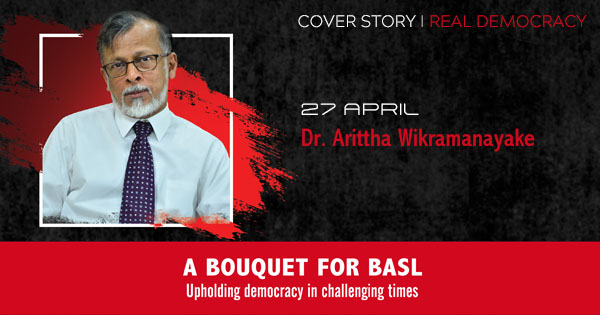REAL DEMOCRACY

The Precedent Partner of Heritage Partners Dr. Arittha Wikramanayake described the standoff between citizens and the government succinctly when he said that “first and foremost, we must understand that the situation is extremely complicated and people are utterly fed up.”
He added: “The demand that ‘all Rajapaksas and their cohorts must go’ is very valid given the level of incompetence, lack of caring and perceived corruption that completely surround them. They have clearly lost all credibility.”
“If you go for these protests and talk to the vociferous young people, their general disgust about all politicians is very evident; and the common rhetoric is that all 225 members of parliament must go – sadly, I tend to agree,” he explained.
Wikramanayake remarked that “the second thing we have got to understand is Sri Lanka’s financial crisis. I think that is no less important than changing the government and getting these rogues to go. A lot of people I talk to seem to think that the IMF will suddenly appear from nowhere, wave a magic wand and we’ll be back in paradise once again. It will not happen,” he opined.
“The first question to ask is whether we are in a position to get a good IMF programme in place. Nothing can be done overnight, and there will need to be many rounds of discussions and negotiations. And even if the IMF plan is worked out, implementation of it will be a huge challenge,” he cautioned.
And Wikramanayake added: “Inevitably it will be a long and painful process, leading to rising costs involving rationalising and downsizing many state owned enterprises.”
Referring to GotaGoGama, he noted: “That gathering is peaceful, and it has united people of all races and religions. People need to be able to voice their ideas, air grievances and let their pressure off. You cannot stop people from demonstrating and exercising their freedom of expression.”
When asked about the judiciary, Wikramanayake explained that “it is there to administer justice – to make sure laws are implemented and enforced – and provide a forum for people to resolve their disputes. With regard to law enforcement, by and large the judiciary has been successful except for delays and inefficiencies that haven’t been addressed for a long time.”
“There are some courts in the country that hear cases only once a year. In the event of a land dispute that comes up once a year, it could even take 20 years to get a resolution. People cannot afford to wait that long. Such inefficiencies would lead to excessive costs to the economy. With improvements in technology, the judiciary could certainly improve its processes to increase productivity and efficiency,” he maintained.
Moving on to discuss the efforts of the legal fraternity in supporting the people’s movement, he elaborated: “I can tell you with all honesty that during most of my career, I haven’t been proud to be called an attorney. I know the way people perceive lawyers – and sometimes when I mention my profession, it has been more of an apology than anything else. However, for the first time in ages, I’ve been proud to say that I am a lawyer.”
“I applaud the Bar Association of Sri Lanka (BASL) for the courage, wisdom and stand it has taken during this crisis. A lot of credit should go to the president of the BASL and his committee. They have been absolutely amazing. Saliya Pieris is not an extraordinary man; he is just like you and me – and he has risen to the challenge and shown everybody what he’s capable of achieving,” he enthused.
He added: “People rarely get opportunities like this in their careers – and even if they do, they’re not big enough to rise to the occasion and the challenges presented to them. The BASL has been courageous enough to demonstrate that you can stand up for change with dignity and inspire people.
“I applaud them; and they made me feel good to be a lawyer again – for that I’m very thankful,” Wikramanayake said, with pride and gratitude.




